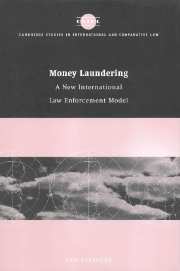Book contents
- Frontmatter
- Contents
- Preface
- Table of treaties and agreements
- List of abbreviations
- Part I New instruments in the fight against acquisitive crime: confiscation of proceeds from crime and criminalisation of money laundering
- Part II The prevention of money laundering
- 4 The application field of legislation on the prevention of money laundering
- 5 The role of financial institutions in the prevention of money laundering
- 6 The role of financial intelligence units in combating money laundering
- 7 The role of the supervisory authorities in combating money laundering
- Part III Jurisdiction over money laundering
- Part IV International co-operation in combating money laundering
- Epilogue
- Bibliography
- Index
- CAMBRIDGE STUDIES IN INTERNATIONAL AND COMPARATIVE LAW
5 - The role of financial institutions in the prevention of money laundering
Published online by Cambridge University Press: 16 October 2009
- Frontmatter
- Contents
- Preface
- Table of treaties and agreements
- List of abbreviations
- Part I New instruments in the fight against acquisitive crime: confiscation of proceeds from crime and criminalisation of money laundering
- Part II The prevention of money laundering
- 4 The application field of legislation on the prevention of money laundering
- 5 The role of financial institutions in the prevention of money laundering
- 6 The role of financial intelligence units in combating money laundering
- 7 The role of the supervisory authorities in combating money laundering
- Part III Jurisdiction over money laundering
- Part IV International co-operation in combating money laundering
- Epilogue
- Bibliography
- Index
- CAMBRIDGE STUDIES IN INTERNATIONAL AND COMPARATIVE LAW
Summary
Preventive anti-money laundering measures impose a number of obligations on financial institutions. Before discussing these obligations in detail, we will first investigate how these obligations derogate from traditional banking principles. Subsequently the obligation to identify customers and the record-keeping obligation will be analysed. Whereas the former obligations derogate from the principle of non-interference in a customer's business, the obligation to report suspicious transactions constitutes a severe inroad into banking secrecy. A last aspect of the preventive legislation concerns the issue of compliance. Finally, the extent to which these preventive anti-money laundering measures have cajoled financial institutions into a policing role will be discussed.
Preventive obligations derogating from traditional banking principles
Banking is in almost any jurisdiction surrounded with – some would say cloaked in – a certain degree of secrecy. The preventive anti-money laundering measures that have been imposed on financial institutions deviate from this tradition of secrecy. To be able to assess the precise impact of these measures, it is therefore necessary to know the exact legal nature of this tradition of secrecy in the banking industry. Although this depends to a large extent upon domestic law, some general principles can nevertheless be outlined. A contractual relationship between a bank and its customer (sometimes referred to in German as the Bankvertrag) generally entitles the customer to a two-pronged discretion. First, there is a general prohibition on a banker – leaving aside a number of exceptions – disclosing any information on his customers to third parties, including government authorities. This first aspect of a banker's discretion, banking secrecy, which is undoubtedly the best known, will be further discussed in Part 4 in the context of measures designed to lift foreign banking secrecy.
- Type
- Chapter
- Information
- Money LaunderingA New International Law Enforcement Model, pp. 143 - 182Publisher: Cambridge University PressPrint publication year: 2000

